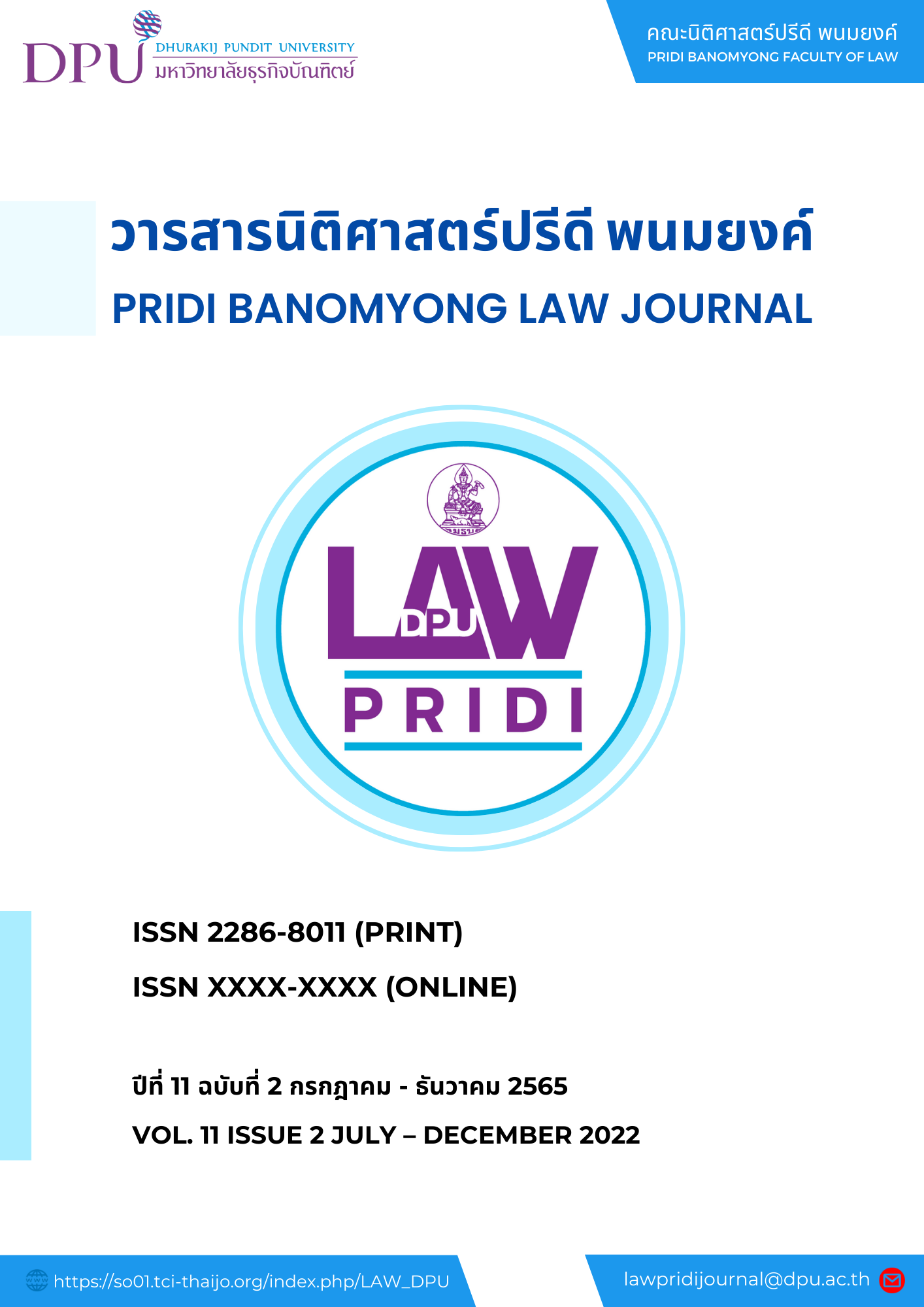FINANCING ENERGY TRANSITION BY PETROLEUM REVENUES AND THE POWER DEVELOPMENT FUND: TRAINING AND CAPACITY BUILDING CONCERNING RENEWABLE ENERGY TO CITIZEN
คำสำคัญ:
Renewable energy, capacity building, Power Development Fundบทคัดย่อ
Abstract
Provision of educational processes to enhance citizen’s knowledge on climate change and energy transition whether in the form of formal or non-formal education system need financial resources and supports. This academic paper analyzes how petroleum concessionaire and contractor-paid petroleum revenues and contributions that an electricity industry licensee paid to the power development fund can help finance renewable energy education and training programs for citizen. Benefited areas include technical, financial, and regulatory fields. It finds that petroleum revenues collected by the State under the Petroleum Act B.E. 2514 (1971) and contributions delivered to the power development fund under the Energy Industry Act B.E. 2550 (2007) can be used to finance education infrastructure development, as well as benefit training courses on climate change and utilization of equipment for renewable energy systems. It first discusses how providing training and capacity building is an essential step towards energy transition. In turn, it reveals how revenues from the petroleum upstream industry carried out under the Petroleum Act B.E. 2514 (1971) can be transformed into financial resources for capacity building and training in an era of energy transition. The third section analyses how the electricity licensing systems, as well as the Power Development Fund under the Energy Industry Act B.E. 2550 (2007) can contribute to capacity building and training.
เอกสารอ้างอิง
Arun Kumar and Murali Mohan, “Artificial Intelligence in Power Station”, 5(1) International Journal of Engineering and Technical Research (IJETR) 37, 37 (May 2016).
Bangkok Post, “Austrian renewable model gets local try,” https://www.bangkokpost.com/ news/environment/1607310/austrian-renewable-model-gets-local-try. June 2, 2019.
Bernard Taverne, “Petroleum, Industry and Governments: A Study of the Involvement of Industry and Governments in the Production and Use of Petroleum,” Kluwer Law International (2nd edn., 2008), p.120.
Charles P. McPherson, “Necessary but not sufficient: anti-corruption and transparency legislation,” 7(3) JWELB (June 2014) 180, 180.
Chulalongkorn University, “CHULA MOOC2012: Where does electricity come from?,” https://mooc.chula.ac.th/courses/227. November 25, 2022.
EGAT, “Change: Moving Towards Digitalized Power Plant,” https://www.egat.co.th/index.php? option=com_content&view=article&id=2957:20190320-art01&catid=49&Itemid=251. June 2, 2019.
Eleodoro Mayorga Alba, A Comprehensive Integrated Approach to Developing Extractive Industries, Washington, DC: World Bank 2009
Greg Gordon, “Petroleum Licensing” in Greg Gordon, John Paterson, and Emre Üşenmez (eds), Oil and Gas Law – Current Practice and Emerging Trends (2nd ed) (2011) p.65.
IRENA, Power System Flexibility for the Energy Transition, Part 1: Overview for policy makers, (International Renewable Energy Agency, 2018) p10.
John W. Sheffield, “Energy Security through Hydrogen,” in John W. Sheffield and Çiğdem Sheffield (eds.), Assessment of Hydrogen Energy for Sustainable Development (Springer, 2007) p6.
Jorge Blazquez, Rolando Fuentes-Bracamontes, and Baltasar Manzano, “A road map to navigate the energy transition,” https://www.oxfordenergy.org/wpcms/wp-content/ uploads/2019/10/A-road-map-to-navigate-the-energy-transition-Insight-59.pdf. September 12, 2022.
Naazeen H. Barma, Kai Kaiser, Tuan Minh Le and Lorena Viňuela, Rents or Riches?: The Political Economy of Natural Resource-Led Development, (The World Bank 2012) p.5.
Office of Natural Resources and Environmental Policy and Planning, “Thailand’s Updated Nationally Determined Contribution,” https://unfccc.int/sites/default/files/NDC/2022-06/Thailand%20Updated%20NDC.pdf. November 25, 2022.
Ravi Mahendra, “AI is the new electricity,” https://www.smart-energy.com/industry-sectors/new-technology/ai-is-the-new-electricity/. June 2, 2019.
Solar Energy Research Association, Networked Knowledge for Renewable Energies (FVS, Berlin, 2004)
Piti Eiamchamroonlarp, “Legal Challenges and Opportunities for Peer-to-Peer Electricity Trading in Thailand,” https://ink.library.smu.edu.sg/cgi/viewcontent.cgi?article=1001& context=ccla. November 25, 2022.
UNICEF, “It is Getting Hot: Call for Education Systems to Respond to the Climate Crisis,” https://www.unicef.org/eap/media/4596/file/It%20is%20getting%20hot:%20Call%20for%20education%20systems%20to%20respond%20to%20the%20climate%20crisis.pdf. November 25, 2022.
UNESCO, “Turning the ‘resource curse’ into a blessing for education,” Retrieved December 22, 2022 from https://unesdoc.unesco.org/ark:/48223/pf0000220443.
United Nations, “Climate Change Education,” https://unfccc.int/blog/climate-change-education. November 25, 2022.
Yinka Omorogbe and Peter Oniemola, “Property Rights in Oil and Gas under Domanial Regimes”, Property and the Law in Energy and Natural Resources, (OUP, 2010) p.116.
เผยแพร่แล้ว
รูปแบบการอ้างอิง
ฉบับ
ประเภทบทความ
สัญญาอนุญาต
ลิขสิทธิ์ (c) 2022 Pridi Banomyong Law Journal

อนุญาตภายใต้เงื่อนไข Creative Commons Attribution-NonCommercial-NoDerivatives 4.0 International License.



